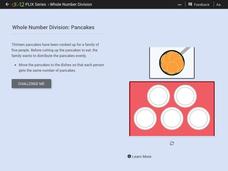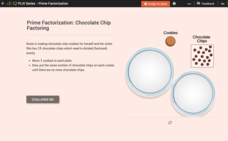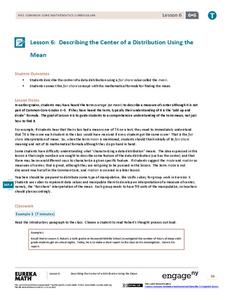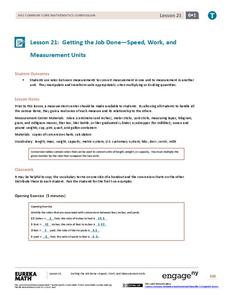CK-12 Foundation
Whole Number Division: Pancakes
Given 13 pancakes and five plates, learners are asked to distribute the pancakes evenly among the plates. Is it possible? Will there be any remainders? These are the questions pupils are asked to answer after manipulating an...
EngageNY
Creating Division Stories
Create your own adventure story ... well, not really. The fifth lesson in a 21-part series has pairs create story contexts for division problems. The lesson presents a step-by-step process for pupils to follow in writing such stories.
EngageNY
Interpreting Division of a Fraction by a Whole Number—Visual Models
Divide fractions just like a model does. Pupils visualize the division of a fraction by a whole number by creating models. Scholars make the connection between dividing by a whole number and multiplication before practicing the skill...
Curated OER
A Remainder of One: A Math-Manipulative Lesson
Students listen to the reading of the book "A Remainder of One" and use math manipulatives to recreat "bug squadrons".
Illustrative Mathematics
How Many _______ Are In. . . ?
Help your learners gain meaningful understanding of dividing fractions using fraction models. The activity includes nine problems which are sequenced to show how the fraction division algorithm evolves. Have learners use graph paper or...
Alabama Learning Exchange
Exponents and Division
Create a human fraction to learn about division of exponents. Scholars develop the rule for division of exponents by being part of a human fraction to explore and justify the rule. They also consider zero exponents and negative exponents.
Rational Number Project
Initial Fraction Ideas: Lesson 3
Visual models support young mathematicians as they deepen their fractional number sense in this elementary math lesson. Using fraction circle manipulatives, children explore basic unit fractions as they develop the fundamental...
Virginia Department of Education
Integers: Addition and Subtraction
Young mathematicians construct their own understanding of integers with an inquiry-based math lesson. Using colored chips to represent positive and negative numbers, children model a series of addition and subtraction problems as...
EngageNY
The Volume Formula of a Pyramid and Cone
Our teacher told us the formula had one-third, but why? Using manipulatives, classmates try to explain the volume formula for a pyramid. After constructing a cube with six congruent pyramids, pupils use scaling principles from...
CK-12 Foundation
Prime Factorization: Chocolate Chip Factoring
An interactive resource challenges mathematicians to show what they know about prime factorization. Five multiple-choice, true or false, and discussion questions use chocolate chip cookies to set a real-world application of the...
CK-12 Foundation
Equivalent Fractions: Number Line
Arrange improper fractions on a number line to determine the equivalency to whole numbers. The number line starts at -4 and ends at 4, while users must turn the improper fraction into a proper fraction in order to place it on the number...
EngageNY
Describing the Center of a Distribution Using the Mean
Everyone does their fair share. The sixth segment in a 22-part unit presents the mean as a fair share. Groups build a conceptual understanding of the mean of a data set, rather than simply learn an algorithm. Learners use the...
EngageNY
Getting the Job Done—Speed, Work, and Measurement Units
How do you convert from one measurement to another? Pupils use unit rates to convert measurements from one unit to another in the 21st segment in a 29-part series. They convert within the same system to solve length, capacity,...
PBS
Add, Subtract and Multiply Fractions
Your future chefs will appreciate this comprehensive instructional activity where learners practice operations on fractions using pizza and soup analogies. Learners begin with a pizza analogy that requires the learners to...
Curated OER
Rep Tiles
Third graders use pattern blocks of one shape at a time to try to create a similar shape. They compare the perimeter of the new figure with the perimeter of the original shape and look for a pattern. Students use the pattern to predict...














